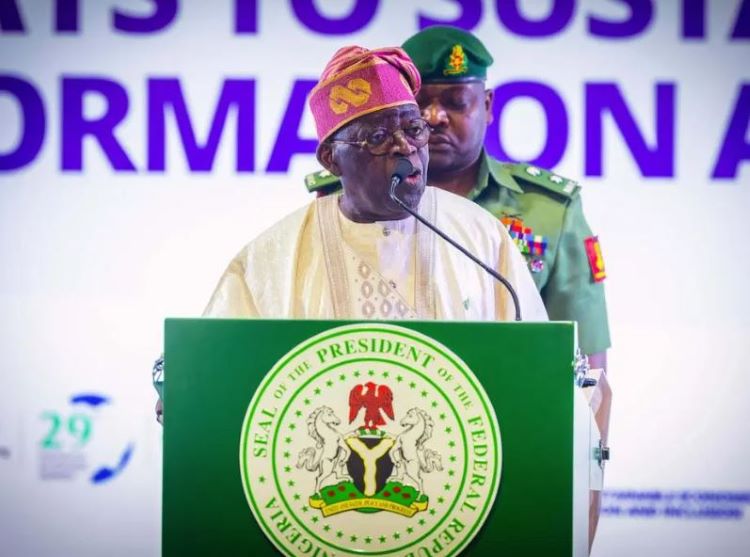President Bola Tinubu on Wednesday assured Nigerians that the country’s “worst days are over.”
He declared that his economic reforms are beginning to deliver results and that hope is rising for a more prosperous nation.
Delivering his national broadcast to mark the country’s 65th Independence anniversary, Tinubu said his administration had chosen “the path of tomorrow over the comfort of today” since coming into office in May 2023, and that Nigerians are now beginning to see tangible results.
“I am pleased to report that we have finally turned the corner. The worst is over, I say.
“Yesterday’s pains are giving way to relief. I salute your endurance, support, and understanding.
“I will continue to work for you and justify the confidence you reposed in me to steer the ship of our nation to a safe harbour,” the President said.
Tinubu hailed the resilience of Nigerians, saying the country had survived a civil war, military rule and political crises, and is still striving to build “a more perfect union.”
He described the 65th anniversary as a moment for reflection on the sacrifices of the nation’s founding fathers and the progress achieved since Independence in 1960.
The President highlighted achievements in education and healthcare, noting that Nigeria has grown from just two tertiary institutions at Independence to 274 universities, 183 polytechnics and 236 colleges of education by 2024.
Tinubu defended his economic reforms, including the removal of fuel subsidies and the unification of foreign exchange rates, which he said ended decades of distortions and rent-seeking.
According to him, these difficult decisions freed resources for investment in infrastructure, education, healthcare and social programmes.
He argued, “In resetting our country for sustainable growth, we ended the corrupt fuel subsidies and multiple foreign exchange rates that created massive incentives for a rentier economy, benefiting only a tiny minority.
“Our administration has redirected the economy towards a more inclusive path, channelling money to fund education, healthcare, national security, agriculture, and critical economic infrastructure.”
The President reeled out a list of 12 economic milestones achieved in the last two years and four months in office.
He said Nigeria’s GDP grew by 4.23 per cent in the second quarter of 2025, the fastest in four years, while inflation had declined to 20.12 per cent, the lowest level in three years.
The President added that non-oil revenue had risen sharply, debt service costs had reduced, foreign reserves had increased to $42.03bn, and the tax-to-GDP ratio had grown to 13.5 per cent.
He also noted that Nigeria had posted trade surpluses for five consecutive quarters, with manufactured exports up by 173 per cent and non-oil exports now representing 48 per cent of total trade.
Oil production, he said, had recovered to 1.68 million barrels per day, while local refining had restarted for the first time in four decades, alongside the export of aviation fuel.
Tinubu argued that the naira had grown more stable. He also boasted of improvements in credit ratings, a booming stock market, and the Central Bank’s first interest rate cut in five years as evidence of renewed investor confidence.
The President said his government was investing heavily in security to consolidate economic gains.
“They are winning the war against terrorism, banditry and other violent crimes. We see their victories in their blood and sweat to stamp out Boko Haram terror in the North-East, IPOB/ESN terror in the South-East and banditry and kidnapping,” he said, adding that peace had returned to hundreds of communities and thousands of displaced persons had gone back home.
He also promised to prioritise food security and agricultural production to lower food costs.
“We must build the roads we need, repair the ones that have become decrepit, and construct the schools our children will attend and the hospitals that will care for our people. We have to plan for the generations that will come after us,” Tinubu said.
Addressing young Nigerians, the President described them as the “greatest assets of this blessed country,” highlighting initiatives such as the Nigeria Education Loan Fund, which has already benefited over 500,000 students, and credit schemes like Credicorp and YouthCred that provide loans for housing, devices and resettlement.
He added that the government was pushing ahead with the $600m iDICE programme, backed by international development partners, to support the digital and creative sectors.
Under the social investment programme, Tinubu said N330bn had been disbursed to eight million households.
He also cited significant progress in transport infrastructure, including rail, roads, airports, and seaports, with major projects such as the Lagos-Calabar Coastal Highway and the Eastern Rail Project underway.
Tinubu acknowledged the pain of reforms but urged Nigerians to remain patient.
“I have always candidly acknowledged that these reforms have come with some temporary pains.
“The biting effects of inflation and the rising cost of living remain a significant concern to our government.
“However, the alternative of allowing our country to descend into economic chaos or bankruptcy was not an option,” he said.
The president concluded his third Independence Day address with a call for productivity and national unity, saying, “Let us be a nation of producers, not just consumers. Let us farm our land and build factories to process our produce.“Let us patronise ‘Made-in-Nigeria’ goods. I say Nigeria first. Let us pay our taxes. Finally, let all hands be on deck.
“With Almighty God on our side, I can assure you that the dawn of a new, prosperous, self-reliant Nigeria is here.”

